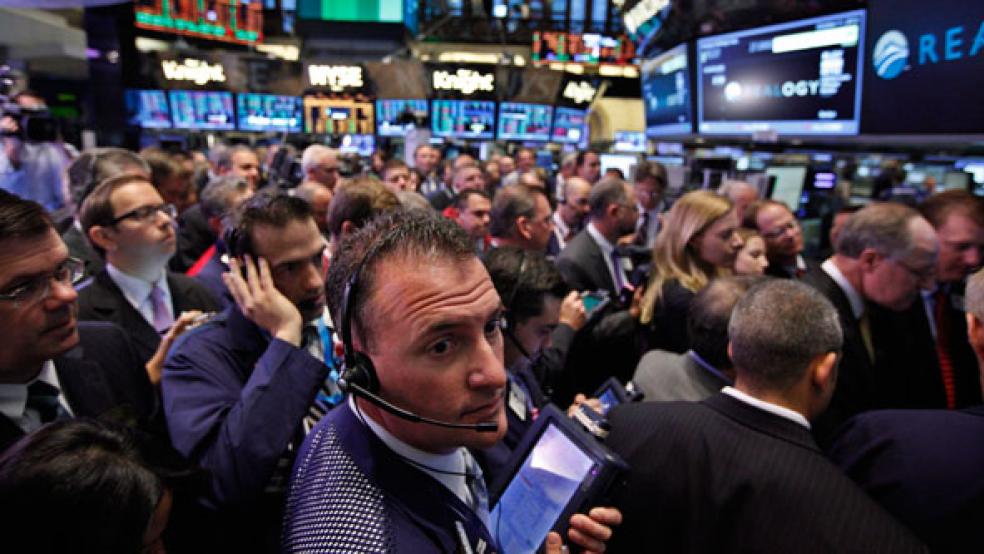If the U.S. stock market continues its record-shattering rise in the days ahead, it will come on the heels of reports that illustrate an economy that is improving. Yet, it's nowhere near the extent to shake up complacency on Wall Street.
"Equities are trending higher and certainly setting new highs. That's a reflection that things are improving here in the U.S., and the thought is that earnings are going to improv - and that's going to drive equity prices higher," said Chris Gaffney, senior market strategist at EverBank Wealth Management.
Related: Economists Predict Worker Pay Increases
Still, strategists are on guard, waiting for the proverbial shoe to drop.
"It's been a very hated market, unable to choice any direction with conviction," said Joseph Tanious, global market strategist at J.P. Morgan Asset Management, who cites low volatility and trading volume as illustrating Wall Street's seemingly joyless ride higher.
"With volatility as low as it is, everybody is kind of afraid. It's human nature, always wondering what's around the corner," Gaffney said.
The CBOE Volatility Index hit its lowest level since February 2007. The VIX, which tends to rise when volatility increases or the market drops, fell 5.6 percent to 11.
Related: How to Grow the Economy? Ask a Millennial
"Volatility has apparently decided to move on after seven years, having outgrown its stale partnership with fear that so well framed the financial crisis and the eurozone debt crisis it spawned... with another monetary easing from the ECB (European Central Bank) out of the way and a recovery to pre-recession peaks for U.S. payrolls, demand for protective options is slipping away," Andrew Wilkinson, chief market analyst at Interactive Brokers, noted in emailed research.
On Thursday, investors will track data on retail sales in May for further evidence that the U.S. economy rebounded in the second quarter after an exceedingly disappointing start.
Retail sales "is the key number next week. People tend not to spend money if they are not confident in their jobs, so we want to see the consumer out there spending money," said JJ Kinahan, chief market strategist at TD Ameritrade.
"That's going to be followed quite closely to get a sense of what's happening with the economic data we've seen," said Tanious at J.P. Morgan Asset Management.
Related: Jobs Market Reaches Another Meaningless Milestone
"It will be interesting to see what it shows, are we through that sluggish first quarter, and is the pace of the recovery improving. Right now it's not," said Gaffney of EverBank.
On Friday, the Dow Jones Industrial Average and the S&P 500 tallied a third weekly jump, with both ending at records, after the May jobs report showed the U.S. had recovered the number of jobs lost in the recession. Investors were also heartened by the European Central Bank's moves to stimulate the region's economy the prior day.
Coming Up:
Monday: St. Louis Federal Reserve Bank President James Bullard speech on economy and monetary policy, 9:10 a.m. Eastern. Federal Reserve Governor Daniel Tarullo speech on corporate governance, 12:45 p.m. Eastern. Boston Federal Reserve Bank President Eric Rosengren speech on monetary policy, 1:30 p.m. Eastern.
Tuesday: NFIB small business index, 7:30 a.m. Eastern; wholesale inventories, 10 a.m. Eastern.
Wednesday: 10-year Treasury note auction, 1 p.m. Eastern
Thursday: weekly jobless claims, 8:30 a.m. Eastern; retail sales, 8:30 a.m. Eastern; import and export prices, 8:30 a.m. Eastern; business inventories, 10 a.m. Eastern; 30-year Treasury bond auction, 1 p.m. Eastern.
Friday: producer price index, 8:30 a.m. Eastern; consumer sentiment, 9:45 a.m. Eastern.
This article originally appeared in CNBC.
Read more at CNBC:




